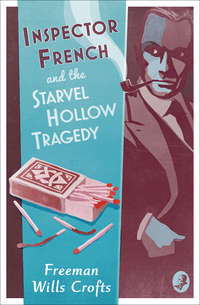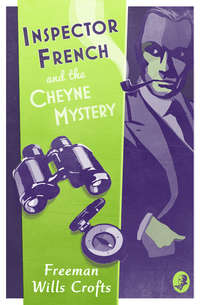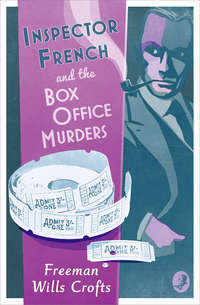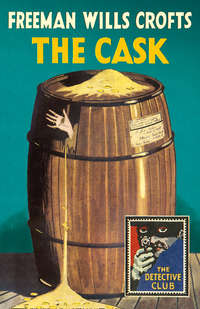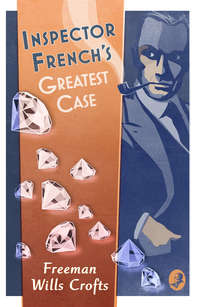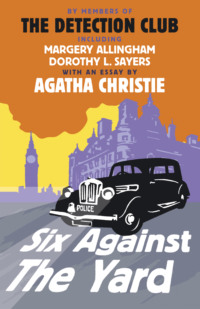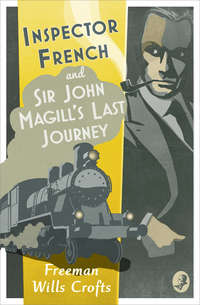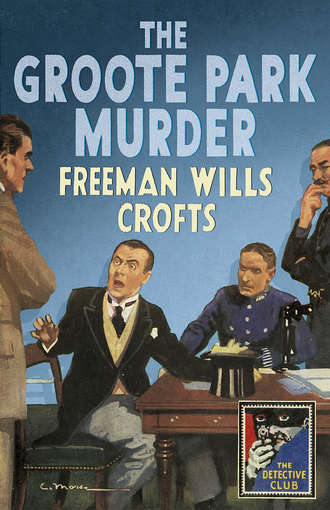
Полная версия
The Groote Park Murder
Inspector Vandam nodded absently as he scrutinised the grassy slope below him. Yes, he was not mistaken; a weight had been dragged down the bank. The bent grasses showed a slightly different colour when looked at parallel to the surface. He crossed the wall.
‘Stay where you are a minute,’ he called to Clarke, as he stooped to examine the ground.
Immediately along the base of the wall, between it and the top edge of the slope, was a flat strip about three feet wide. On it, just opposite the deep footmarks on the park side, the grass was beaten down as if a weight had lain on it, and from this the marks of descent to the rails were unmistakable.
Vandam moved slowly down the slope, noting every indication that he could find. The object appeared to have been something under two feet in width, and at one point it seemed to him that a halt had been made, though of this he was not certain. At the bottom of the bank there were further traces. Vaguely-marked footsteps showed at the edge of the offset, and two faint tracks or scrapes were visible coming on to the offset and turning in the direction of the tunnel. These scrapes were each about an inch wide and ran parallel, a foot apart. They were lost to view almost at once when they passed from the soft ground at the edge of the offset on to the beaten track at its centre.
Calling to Clarke to follow him down and to keep clear of the traces, Vandam scrutinised the ground to the tunnel, but without finding further marks. Then, having reached the scene of the tragedy, he listened to the other’s detailed description of what had been found.
‘Not much blood about,’ he commented, as he stood looking down at the traces which still remained.
‘That’s so,’ Clark admitted. ‘I noticed that. It would all be the way he was struck.’
Vandam did not reply. A terrible possibility had suddenly flashed into his mind, and he stood silently considering how far the various points he had learned would fit in with it. At last he turned once more to his companion.
‘I take it that body is still at the station?’ he asked.
‘Yes, sir. I have done nothing yet about getting it shifted.’
‘I’d like to have a look at it.’
Twenty minutes later the two men stood gazing down on all that was mortal of the late Albert Smith. But the Inspector did not delay there long.
‘Where are the clothes?’ he demanded.
Clarke took him to the next room. Instantly the Inspector picked up the shoes, and turning them over, glanced at the backs of the heels. For a moment he stood staring, then laid them down again very deliberately.
‘Clarke,’ he said slowly, ‘it’s well that gardener found the notebook. This is neither accident nor suicide. Albert Smith has been murdered by a carefully thought out scheme. How did you come to miss that? You should have spotted it.’
For once the sergeant’s face became expressive. Blank amazement amounting almost to awe was stamped on its every feature. He gasped, speechless.
‘Let it be a warning to you about taking things for granted,’ went on Vandam gravely. ‘Here, look at this.’
Once more he picked up the shoes, pointing to the backs of the heels. They were marked with a number of slight scratches, running up at right angles to the tread.
‘You see, he’s been dragged down the bank with his legs trailing on the ground. The track of the body is quite clear on the slope, and I found where the two heels dropped on the offset and were dragged along towards the tunnel. He was carried over that leaf-mould and dropped on the bank over the wall. And do you know the reason there was so little blood on the railway?’
Clarke recovered himself with an effort.
‘He was dead, sir?’ he suggested in somewhat shaky tones.
‘Of course, because he was dead. You might have thought of that, even if you saw nothing else. And there was another thing that you might have thought of, too, if you hadn’t been so darned sleepy; the way the body was torn up. How do you think that happened?’
‘I don’t quite follow, sir,’ the unhappy man stammered.
‘No, because you won’t use your brains. Think a minute. If the man had been struck when he was standing or walking he would have been thrown clear by the cowcatcher. But if the body was lying on the ground—laid across the rails in all probability—why, it could hardly have escaped the kind of damage it got. See what I mean?’
Clarke murmured incoherently.
‘I don’t say it would always happen that way,’ the Inspector went on after a pause, ‘but the thing might have let you smell a rat. Yes, there’s no doubt the man was murdered. Murdered, I should think, in that shed, but of that I’m not yet sure.’
‘I never thought to doubt—’ Clarke was beginning when the other interrupted him.
‘Well, you’ll know better next time. That’ll be all about it, only you’ve lost your scoop. Now, let us get ahead. We’ll go down and examine that ground again while the traces are fresh.’
They retraced their steps down the railway, halting opposite the potting shed.
‘Let’s see,’ Vandam thought aloud. ‘We may assume the murderer carried the body down from the shed and left it on the line there, so as to make the thing look like an accident. Then he cleared off. Now, how? Where did he leave the railway?’
He stood for a moment humming a tune, then went on:
‘It’s unlikely that he would go through the Ballat Road bridge, because the station yard starts at its far end and he would fear being seen by a shunter or signalman. And it’s even less likely that he would go in the opposite direction, out of the far end of the tunnel, for about a hundred yards farther on is the Edward Street level crossing, well lighted and with a gatekeeper in charge. Where, then, would he go?’
Sergeant Clarke had recovered from his confusion.
‘Over there, sir, I should think. There’s a passage for getting to the yards of those houses runs along back of the wall. A man could dodge over there without being seen, and slip out at the end into Craven Street when the coast was clear.’
‘Exactly what I think,’ Vandam agreed. ‘Let us walk along and see if we can’t find tracks going up the slope.’
A moment later, Clarke gave a hail.
‘Here you are, sir,’ he called. ‘Plain as you’d wish.’
Stretching up the bank were similar though fainter traces to these leading to the park on the opposite side. Vandam spent several minutes examining them, and at last was satisfied that someone had passed in each direction, up and down.
He worked gradually up the bank and was about to climb the wall to look for traces on the other side when, glancing down, he stopped suddenly. At the foot of the wall, embedded in the grass, lay a few scattered stones. His sharp eye had seen that one of these had been recently moved. Though it was still in its bed, it was not fitting properly, and instead of the grass growing up to it there was a trace of fresh brown earth round its edges. Vandam stooped and with an effort lifted it. As he looked into the hole which it uncovered he whistled.
Beneath the stone lay two objects, either of which would have filled him with interest. One was an ordinary two-pound joiner’s hammer, almost new, judging by the varnish on the handle. But it was not on the varnish that Vandam’s eyes were fixed. On the head was a dull stain of blood!
The other object looked harmless enough in comparison, and yet to Vandam it seemed even more sinister. It was a tiny roll of stout canvas, not unlike a belt. Vandam picked it up and it resolved itself into a little bag about three inches in diameter and two feet six long. Both ends were sewn up tightly, but near one of them the canvas had been gashed with a knife. Vandam held his hand under the hole and shook the little tube. Some grains of sand fell out.
‘Just so,’ he thought. ‘Sandbagged in that shed. But what in all this earthly world was done with the hammer?’ He turned to his subordinate. ‘Here, Clarke, bring along that hammer. But don’t touch the clean part of the handle; there might be a fingerprint on it somewhere.’
Postponing consideration of his treasure-trove, Vandam continued his search. He climbed the wall and found himself in the lane leading into Craven Street. But its surface was hard, and though he examined it carefully from end to end, he could find no trace of anyone having passed.
Having sent Clarke for an acetylene lamp, Vandam returned to the potting shed and began one of his painstaking examinations. Every inch of the floor and shelf was scrutinised, every grain of the little heaps of soil which lay scattered about was sifted through his fingers. But his discoveries were negligible. One thing only he found, and that a triviality. The ashes in the corner were the remains of newspapers. Beyond that there was nothing.
He stood motionless, pondering over the tragic business.
First of all he wondered at what time the murder had taken place. Before 11.10 on the previous evening obviously, because the body had been struck by a train at that hour. But how much before? The murderer would want some margin of time to get the body into position and to allow for unexpected checks. But he would make this margin as short as possible, to reduce to a minimum the risk of the remains being found before the train passed. It seemed to Vandam that the meeting in the shed must have taken place about half-past ten or a little later. This, of course, was guesswork, but he could hardly picture even so cold-blooded a criminal as this ruffian must be, despatching his victim at an early hour in the evening and then sitting in the shed with the corpse, waiting until it should be time to drag it down to the line.
A further point struck him. It would, of course, be dark at this hour. Would a light not therefore have been necessary in the shed? The burning of the papers, if that had been done at the same time, would certainly have made a light. What chance would there be of that light having been seen.
Quite a good chance, Vandam decided. Though the majority of the evening visitors to the park kept down at the other end near the electric arcs and the bandstand, isolated strollers might penetrate as far as the gardens. And the screen of evergreens, though thick, could not be depended on to prevent a light showing through. Therefore, if the affair was to be kept secret before those papers could have been burned or a light used, the door must have been shut. There was, of course, no window.
Hoskins had opened the door that morning from the outside, but he hadn’t touched the inside. The murderer’s fingerprints should therefore be intact.
Vandam brought his lamp to the back of the door, and he experienced a shock of real disappointment when he saw that the woodwork was too rough to receive impressions. He would get no help there.
He felt slightly overwhelmed as he thought of the variety of problems which awaited solution. Who was guilty of the murder? What was the motive? Was more than one person involved? How had Smith been lured to the shed? What was the meaning of the sweeping of the floor and the burning of the newspapers? What had been done with the hammer? These were but a few of the salient points, and on not one of them had Vandam the slightest suggestion to offer.
But he realised that this was the position of affairs at the beginning of every inquiry, and he was by no means downhearted. Rather was he pleased that what would undoubtedly prove one of the most thrilling and important cases of the year had fallen to his lot.
He did not see that he could learn anything more on the ground, and his next business must undoubtedly be to find out as much as possible of Smith’s life and personality. No doubt he would thus come across some clue which would lead him to the solution he desired.
Having sent Clarke to get a padlock put on the door of the shed, he returned to headquarters. There he tested the hammer for fingerprints, but unfortunately here again without result. Next he returned to the station, made a further examination of the murdered man’s clothes, took prints from the dead fingers, and lastly, having set in order the facts he had learnt, went in and had a long interview with his Chief.
CHAPTER III
GATHERING THE THREADS
INSPECTOR VANDAM, hot on a new case, was a very different person from the same man engaged in routine police work in his office. Not that he was at any time slack or lazy; he was naturally too efficient and hardworking for that. But the interest of a new mystery stimulated him to an enthusiasm which rendered him careless of rest or even food, and drove him on with a tireless energy until he had either found a solution of his problems or satisfied himself that none was obtainable.
In the present case, though it was considerably after his usual lunch hour when he left his Chief’s office, he contented himself with a five-minute pause for a sandwich and a cup of coffee in a restaurant before starting the next phase of his investigation. He never drank alcohol, saying that it stupefied him, while hot coffee, he held, stimulated his brain to keener and more incisive thought. Many a criminal was brought to justice, he used to claim, as a result of his coffee habit.
He had decided that his first business must be a call at Messrs. Hope Bros. store in Mees Street. The knowledge gained since Sergeant Clarke had been there earlier in the day necessitated inquiries of a different kind to those already made, and he entered the great building and asked for the manager in the hope and belief that before he came out he would have learned at least the direction in which his subsequent inquiries should tend.
Mr Crawley, it seemed, was again out, and, like the sergeant, he was received by the assistant manager, Mr Hurst.
‘I am sorry to trouble you again about this affair,’ Vandam began, when he had introduced himself and stated the subject of his visit, ‘but our people at headquarters are not quite satisfied that we have really got to the bottom of it. They fear it may not have been the accident it looked like at first sight.’
The assistant manager stared. Vandam, whose golden rule was to give nothing away and distrust everybody, watched him keenly and unobtrusively. But there was neither embarrassment nor undue interest in the man’s manner as he exclaimed:
‘Now just what do you mean by that, Inspector?’
Vandam leaned forward and spoke confidentially.
‘There’s a suggestion of suicide.’
Mr Hurst whistled.
‘So that’s the idea,’ he returned. ‘What makes you think that?’
‘We can’t see what else would have taken him to the railway at that time.’
‘Not very conclusive, is it? That your only reason?’
‘Not exactly,’ Vandam answered slowly. ‘There are others. But what do you think of the suggestion?’
Mr Hurst moved impatiently.
‘I don’t think much of it,’ he declared. ‘Smith wasn’t the suicide kind, not by a long way. Too darned fond of himself.’
‘A coward, you mean?’
‘No, not a coward. I mean he was always out to get the best for himself. Suicide wouldn’t be his line except as a last resource, and, so far as I know, he was not in difficulties.’
‘You don’t seem to have liked him very much.’
‘I didn’t like him at all,’ Hurst returned with some warmth, ‘though maybe it’s not quite the thing to be saying so with the chap just dead. But his death doesn’t alter facts. I didn’t like him and I don’t know anyone else who did.’
‘How do you account for that?’
Mr Hurst shrugged his shoulders.
‘Hard to say. Manner perhaps. But he wasn’t popular anyhow.’
‘It’s always an astonishment to me,’ Vandam remarked easily, ‘what a difference manner makes—a thing, as you might say, that there’s really nothing in. However, that’s by the way. You tell me this deceased gentleman was not popular. Now, was there anyone he actually had a row with?’
Mr Hurst favoured his visitor with a keen glance.
‘Plenty,’ he said, dryly. ‘I had a row with him myself last week. He has got across most of us at one time or another.’
‘I don’t mean trifling differences,’ Vandam insisted. ‘Were there any really serious quarrels?’
‘I could hardly tell,’ Hurst answered. ‘Once, I know, he had a scrap with another man—one of our own staff too. I went into one of the yards and I found him and this chap, a man called Swayne, fighting rings round with half the storemen looking on. Would you call that a serious quarrel?’
‘I could hardly tell either,’ Vandam smiled. ‘Were they in earnest about it?’
‘In earnest! They were out for each other’s blood. It was the devil’s own job to get them separated. They were evenly matched; both big, strongly developed men, and for a time it might have gone either way. Then Smith got Swayne down, and I wouldn’t mind betting he’d have throttled him only for the others. They rushed in and dragged him off. Swayne was nearly unconscious. They were both pretty wild at first, and each swore he would do the other in, but next day the thing seemed to have blown over.’
‘Which was in the wrong?’
‘I don’t know. No one ever did know what started it. But Smith was always nagging at Swayne, and I expect he went too far. I don’t know how Swayne stood it the way he did.’
‘Was that long ago?’
‘About a month, I should think.’
‘It looks as if Smith had some hold over Swayne.’
‘That’s what I’ve thought more than once. Swayne isn’t a bad chap and he’s certainly no coward, but he always seemed to have the wind up where Smith was concerned.’
‘He’s on your staff, you say?’
‘Yes, he’s our sales manager.’
‘I’d better see him,’ Vandam declared. ‘He might know something that would help.’
‘Then I’m afraid you’ll have some way to look. He’s just gone to England on three months’ leave to visit his relatives. Lucky chap! I wish I could get a trip like that.’
Inspector Vandam’s hopes, which had been steadily rising during the conversation, suffered a sudden drop.
‘Oh,’ he said helplessly, ‘he’s gone to England, has he? But you say he’s coming back?’
‘Yes. We’re keeping his job for him. He’s a smart fellow, too good to lose.’
‘Is it long since he left?’
‘Only just gone. He left last night.’
The night before! The night of the murder! Vandam’s hopes made a sharp recovery. Certainly he must find out more about this Swayne.
He resumed his interrogation. It seemed that Smith had also been at loggerheads with no less a person than Mr Crawley, the manager. They had had friction over some private business, the details of which Hurst did not know. But Crawley had not allowed the matter to affect their business relations, and Hurst believed it also had blown over.
Vandam asked a number of other questions, but without gaining much more information. In spite of his careful probing, he could hear of no one else whose relations with Smith were really suspicious. Therefore, having obtained the address of Swayne’s landlady with the object of prosecuting inquiries there, he thanked Hurst for his trouble, and took his leave.
His next business was at Smith’s rooms, and a few minutes’ walk brought him to Rotterdam Road. It was a street of compara-
tively new houses, mostly residential, but with a sprinkling of shops and offices. No. 25 was wedged in between a tobacconist’s and an exhibition of gas stoves, and showed in its lower windows cards bearing the legend, ‘Apartments.’ The Inspector knocked at the door.
It was opened by an elderly woman with hard features and a careworn expression, who explained that she was the landlady. Upon Vandam stating his business, she invited him in, and answered all his questions freely. But here he did not learn a great deal beyond the mere fact that Smith had occupied rooms in the house. Mrs Regan seemed genuinely shocked at the news of her lodger’s death, though Vandam suspected this was due more to the loss of a paying client and the unwelcome notoriety which would be brought on her establishment than to personal regard for the deceased.
It seemed that Smith shared a sitting-room with a Mr Holt, a bank official, though the two men occupied separate bedrooms. On the previous evening, the night of the murder, Smith had returned at about six for supper, his usual custom. Holt was later that night and did not turn up until past seven. Mrs Regan in bringing up Smith’s tray had ‘passed the time of day’ with him, as was her habit when either gentleman was alone. Smith seemed restless and excited. She imagined he had something on his mind, and this opinion was confirmed when she found later on that he had eaten hardly any supper. He had gone out shortly after eight; she had not seen him, but he had called through her door that he was going out into the country and might not be back that night. He had never returned, nor had he sent her any message.
Mrs Regan gave her late lodger a good character ‘as young men go,’ but with a curious reticence in her manner, which Vandam put down to personal dislike. The deceased was rather silent and uncommunicative, but was not too inconsiderate about giving trouble. He did not often drink to excess, nor did he bring undesirables to the house, though he kept pretty late hours. But principally he was a good pay. It seemed that to Mrs Regan prompt payment covered a greater multitude of sins than charity.
The landlady could not give a list of Smith’s friends. He had very few visitors, and of those who did come she seldom learned the names. She suggested that Mr Holt would be better able to help, and gave his business address, the Central Branch of the Union Bank.
Neither could she, in answer to Vandam’s veiled questionings, suggest anyone who might have had a grudge against the deceased. The Inspector was satisfied from the way she made her statement that she was being as helpful as she could, and thanked her politely.
‘I must search his rooms, I’m afraid,’ he continued. ‘Perhaps you would show me up?’
The rooms, one of which was on the first and the other on the second floor, were typical of the middle-class lodging-house, somewhat drab and dingy as to furniture, but not exactly uncomfortable. Dismissing Mrs Regan, who was becoming a trifle garrulous, Vandam set himself to make a systematic examination of the contents. In the sitting-room he was somewhat handicapped by the fact that he was dealing with two men’s belongings, but in any case he found nothing that assisted him. Nor when he went to the bedroom had he at first any better luck. Though he examined everything with the utmost minuteness here also, he came upon nothing of interest until he turned to a small metal despatch case which was on one of the shelves in the wardrobe. It was locked, but locks were but slight obstacles to Inspector Vandam, and with the aid of a skeleton key from a bunch he always carried, it soon stood open. Within were a bundle of miscellaneous papers, some receipts, a few letters, a number of bills and a bank book. The bills caused Vandam to whistle softly. Three were from jewellers; for a pearl pendant, £15 15s., a pair of earrings, £7 10s., a wristwatch, £5 12s. 6d.; several were from fashionable costumiers, among them one for a fur stole at £20, and others for gloves and flowers. Altogether they totalled to over £100.
Vandam metaphorically smacked his lips. When in a puzzling case he came on what he was pleased to term ‘the trail of the woman,’ he felt he was moving forward. That Smith was the kind of man these bills revealed him to be did not prove anything, but it was suggestive. A dispute over a woman! What more fruitful source of tragedy could be imagined? An obvious line of inquiry suggested itself. He must learn the identity of the woman or women in question, and find out if other suitors were in the field.
He picked up the bank book. A glance showed that the last balance had been struck a fortnight previously, when some £45 only stood to the deceased’s credit.
Smith, then, had been hard up. Not down and out, but still hard up. Though on his £400 a year he could no doubt have paid the £60 odd owing, an examination of the dates of the bills showed that so far from saving, he had been growing rapidly more extravagant during the month or two preceding his death.


